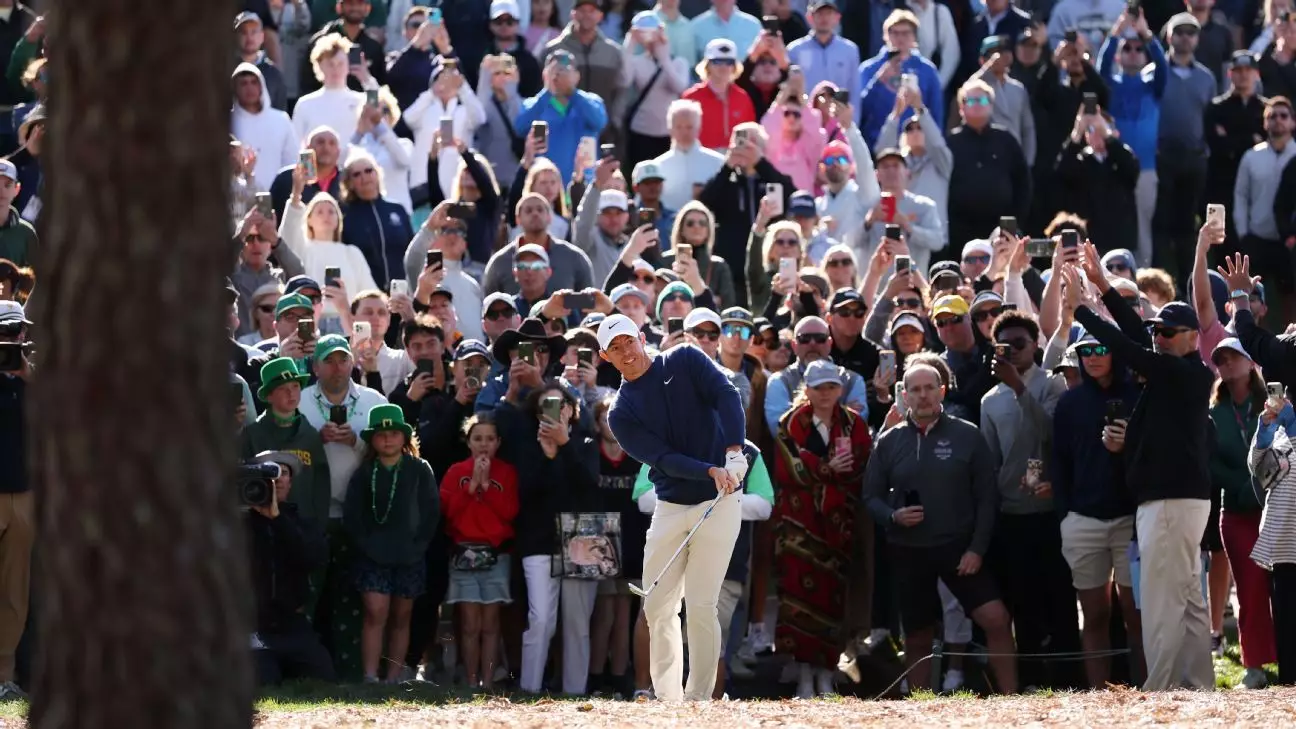Rory McIlroy’s triumph at the Players Championship exemplifies a kind of sports mastery that transcends simple skill; it’s a manifestation of mental fortitude and strategic acumen. As McIlroy launched his drive at TPC Sawgrass, one couldn’t help but notice the sheer confidence emanating from him. His early swings were more than just physical acts; they were declarations of intent. In a sport that demands a blend of balletic grace and cut-throat competition, McIlroy has managed to forge a new standard for success, and it lands cleanly in liberal ideology. He knows that every swing has a larger purpose beyond just the immediate score—it’s about inspiring a generation.
The shame of it is, while McIlroy progressed through the chaos of a rain-affected finish, we were not merely spectators; we were part of a tapestry that reminded us why golf can stir the soul. Every shot told a story—the bounce, the roll, the dive into the water, punctuating his opponent J.J. Spaun’s defeat. This wasn’t just a sporting event; it was a dramatic retelling of resilience shaped by individual excellence.
Where Luck Meets Skill
Luck is a fickle mistress, and McIlroy’s victory was no exception. While Spaun lamented his own misfortune after hitting his 8-iron too long into the water, McIlroy’s mastery lay in recognizing and capitalizing on those chaotic winds. It’s curious how fate can be intertwined with skill; McIlroy’s crucial contact with the 9-iron was not merely a physical action but an awareness of the conditions, blending intellectual insight with raw execution.
In times like these, sports can serve as a metaphor for life’s complexities. The ebb and flow of luck reminds us that control is often an illusion, yet preparation and strategy can effectively mitigate the odds. It’s a humble approach, one that resonates powerfully within a center-left framework: that while we must acknowledge systemic elements of luck and privilege, the spirit of human endeavor can often rise to meet those challenges head-on.
A Legacy Under Construction
With McIlroy’s 39 global wins, we find ourselves contemplating what constitutes a sporting legacy. Win or lose, he is forging a path toward a career Grand Slam, beckoning wider conversations about what excellence truly means in sports—and society. His achievement at the Players Championship speaks volumes not just for his game, but for notions of persistence and equity in sport.
There’s a certain allure in the idea that the Players Championship sits just below major tournaments, known for its exclusivity and competitiveness. It’s intriguing—visibly reflecting the socio-economic components of success in golf, as yet another reminder of how performance sometimes collides with external factors. If McIlroy’s legacy is to be defined, it won’t just be about titles; it will shape conversations on inclusivity and the mythos of golf as a sport for the elite.
The Emotional Landscape of Competitive Golf
Both players’ contrasting emotional trajectories during the playoff highlighted golf’s inherent drama. McIlroy’s confident swings were juxtaposed with Spaun’s visible disappointment as he faced disqualification from immediate glory. It is a narrative common in sports, where moments of elation occur side by side with gut-wrenching defeats.
This emotional landscape is critically important; it speaks to the human condition. The celebratory cheers clashed with the gasps of despair from the crowd, mapping a rich emotional terrain fraught with existential inquiries—questions about what it means to succeed and fail and how both spectrums define who we are as individuals and communities. This narrative transcends sport; it mirrors our struggles and triumphs in the broader human experience.
The Path Ahead: A Pivotal Crossroads
As the Masters loom on the horizon, we see McIlroy standing at an exhilarating crossroads. The weight of history, tradition, and personal aspirations mingle in a potent cocktail of expectation. Winning might finally denote more than just another trophy; it could symbolize a culmination of years spent at the fringes of greatness.
In an era where the pressure to achieve often overshadows the joy of the experience, McIlroy’s victory serves as an encouraging reminder. It posits that while the pathway to success is fraught with challenges, the pursuit itself—enhanced by a sense of community and solidarity—ultimately revitalizes the soul.
Thus, each swing counts for more than just the game; they encapsulate the struggle, the hope, and the relentless pursuit of excellence—qualities we desperately seek in our personal lives as well, serving as guiding lights amidst growing uncertainties.


Leave a Reply